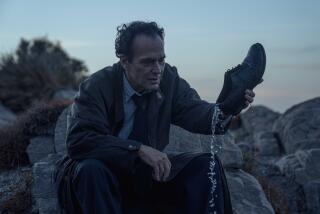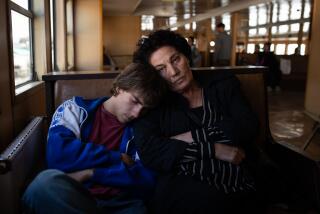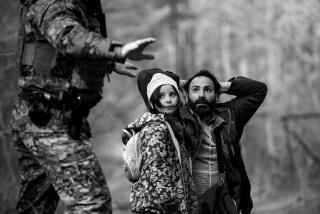Finding roots in a reel Balkan village
It looks like a movie set -- fitting, considering it was created by one of Europe’s most famous film directors.
Bosnian-born Emir Kusturica, winner of more top prizes at the Cannes Film Festival than almost any other director, has built a remote mountaintop hideaway here in western Serbia from scratch.
Pitch-roofed wooden buildings sit quaintly amid a deep green forest. Kusturica brought the wood frames, piece by piece, from nearby abandoned villages and painstakingly reassembled them here to form an unusual retreat: lodges that can be rented, cafes, a fake jail and, the centerpiece, an imposing Serbian Orthodox church, complete with golden Byzantine-style icons, dedicated to St. Sava, patron saint of the Serbs.
When he is not on world tour, or making another movie, or judging at Cannes, Kusturica spends most of his time here, his picturesque, and heavily sanitized, vision of an old-fashioned Balkan village.
For Kusturica, the village is a way to connect with history and tradition, or at least the history and tradition that he now embraces. Born a Muslim in Sarajevo, Kusturica is polishing his Serbian credentials and nurturing his newfound Serbian roots.
Kusturica is renowned in the world of cinema for raucous portrayals of life in the Balkans, life that is part circus, part tragedy, often descending into darkly humored slapstick. His most celebrated film, “Underground,” which won him a second Palme d’Or in 1995 at Cannes, is seen as a metaphor for the breakup of Yugoslavia, a metaphor that some critics believe excused Serbs from responsibility. He also earned Best Director’s Prize at Cannes in 1989 for “Time of the Gypsies,” which is the basis of a new “Gypsy punk opera” that Kusturica debuted in Paris this summer.
Despite his cult-celebrity status in Europe, Kusturica remains a controversial figure in the former Yugoslavia, primarily because his critics believe he abandoned his native Bosnia-Herzegovina at its time of greatest need.
As war erupted in 1992, and Serbian forces laid siege to the Bosnian capital, Sarajevo, killing tens of thousands of Bosnians, Kusturica’s family fled to Montenegro. When Kusturica, who was abroad at the time, eventually returned to Yugoslavia, it was to Serbia, headquarters of Bosnia’s enemy. He took up residence in the capital, Belgrade, and eventually rejected his family’s Muslim religion, the majority faith in Bosnia.
That rejection became complete, according to reports in the Serbian media that he never challenged, when Kusturica formally converted to Orthodox Christianity inside a thick-walled monastery and took the Serbian name Nemanja, in honor of the founder of a glorious Serb dynasty who was canonized as a saint.
Although his family had been Muslim for several hundred years, Kusturica said that it was a feature adopted only to survive the Ottoman occupation, as many Bosnian Slavs did at the time. He now feels they were really Serbs all along.
“I’ve reached the 50th year of my life, and now every question related with life also includes thinking about death,” he told the Belgrade newsmagazine NIN. “When I leave, I want to leave to my offspring a clear idea about identity.”
For many Bosnians, this was the ultimate betrayal. His films were banned for many years in Sarajevo, and to this day he probably cannot, or would not, return to the once-proudly multiethnic city.
And so, the famously volatile Kusturica, who has been dogged by questions (from the media, from critics, even from fans) about his loyalties and his ethnicity, now finds solace in this isolated and fabricated village. It is both refuge and statement.
Goran Gocic, a Serbian film critic who has written a biography of Kusturica, said the director first used his art to connect to his preferred identity and is now attempting to broaden that search for tradition.
“He did it in his movies, and now he wants to explore his tradition in a deeper way,” Gocic said in an interview from Belgrade. “He is trying to extend his tradition to other fields. He wants to be a Renaissance man.”
Kusturica has several names for his retreat, which reportedly cost more than a million dollars to create, including: Mecavnik, for the mountain it sits on, and Kustendorf, a play on his surname. He says he spotted the site a few years ago when he was filming the 2004 movie “Life Is a Miracle” on a nearby hill.
In addition to the lodges, he has included a gourmet restaurant, an underground basketball court and a movie theater. Mecavnik is gradually becoming a popular point of pilgrimage for Serbs from across the shrinking nation, diminished by years of breakaway wars against the oppressive regime of Serbian demagogue Slobodan Milosevic, who died last year.
Partly because of the standout church, with its peculiar multi-tiered roof, Kustendorf has also become a sought-after venue for weddings.
“It is absolutely miraculous, all of this created from the head of one man,” said Gorica Popovic, one of Serbia’s most prominent actresses, who comes to spend the occasional weekend holiday and who was also participating in a recent rehearsal of the Gypsy punk opera.
“This is a spiritual place,” she said.
Several of the wooden lodges are named for characters in the novels of Ivo Andric, the Yugoslav Nobel laureate whom some Bosnians now condemn because they regard his writings as anti-Muslim. The bridge over the Drina River, subject of Andric’s greatest work, is not far from here. An estimated 3,000 Bosnian Muslims were killed by Serbian paramilitary forces in the area around the bridge during the 1992-95 war.
Besides criticizing his native Bosnia, Kusturica has also spoken out against Hollywood, the globalization sweeping Belgrade and the Western corporate culture. He has carried some of that ideology into the restaurant and cafes here in his new village. Instead of Coca-Cola and whiskey, on sale are Serbian plum brandy and natural juices in bottles with pictures of Che Guevara.
On a recent afternoon, Kusturica was rehearsing the punk opera in Kustendorf’s subterranean basketball court. He sat to one side, picking at an ice cream sundae as the band he helped create, the No Smoking Orchestra, ran through riffs. Musicians in Che T-shirts pounded guitars and squeezed accordions, while dark-haired singers ululated the mournful lyrics of love and betrayal. The band was formed in Sarajevo before the war but, like Kusturica, has left Bosnia behind.
As they practiced, schoolchildren wandered through the village’s central square and other public areas.
“We like something like this, that is so authentic and well-preserved,” said Lidija Milosavljevic, a schoolteacher from Aleksandrovac, Serbia.
From its hilltop vista, the sky was clear and the air fresh. And looking westward, despite Kusturica’s rejection, it was easy to see Bosnia.
Comments? Email travel-feedback@latimes.com
More to Read
Sign up for The Wild
We’ll help you find the best places to hike, bike and run, as well as the perfect silent spots for meditation and yoga.
You may occasionally receive promotional content from the Los Angeles Times.







